
<OLD>>>>
INTERNATIONAL SPACE STATION
International Space Station (ISS) is a ginormous topic in astrophilately. Not only because it became a multinational venture but also because it became much easier to get relevant postmarks and produce cachets. Many astro-philatelists apply their own cachets on the postmarked covers and variations are not traceable unlike in old times when the cachets were mostly a product of a handful of companies and dedicated servicers.
Another point is a Space Mail (e.g. flown covers) started during MIR age these covers have generally became private initiatives of several dealers having good connections with cosmonauts. Even “official” issues of Roscosmos and RKK Energia are very hard to obtain as they mostly travel abroad to be sold to western collectors. The letters to and from the ISS are serving collectors demands as well giving relevant people extra $$$. ISS also introduced board special postmarks which were produced by Marka (Stamp) state company to be used on specific occasions.
As I said – ISS is a complex subject covering not only manned missions from Russia and USA including participating countries but also cargo ships from Russia, Europe, US and Japan. I never put the goal to get all the possible coverage of ISS activities, just getting the relevant stuff from time to time. At some point I realized that there are a lot of gaps and this site is very useful to show them clearly. I will try to keep the chronology of the events in any case.
It all started with the launch of Zarya module on Nov 20, 1998. Zarya, also known as the Functional Cargo Block or FGB, was the first module of the International Space Station to be launched. The FGB provided electrical power, storage, propulsion, and guidance to the ISS during the initial stage of assembly. The module was funded by the US while designed and built in 1990s and belongs to NASA although it remains a part of Russian segment.
This is the ISS flown cover to commemorate 15th anniversary of the event. The cover has special ISS postmark and signed by ISS 38 crew: Oleg Kotov, Koichi Wakata, Richard Mastracchio, Sergey Ryazansky, Mikhail Tyurin and Michael Hopkins



Rollover

roll out
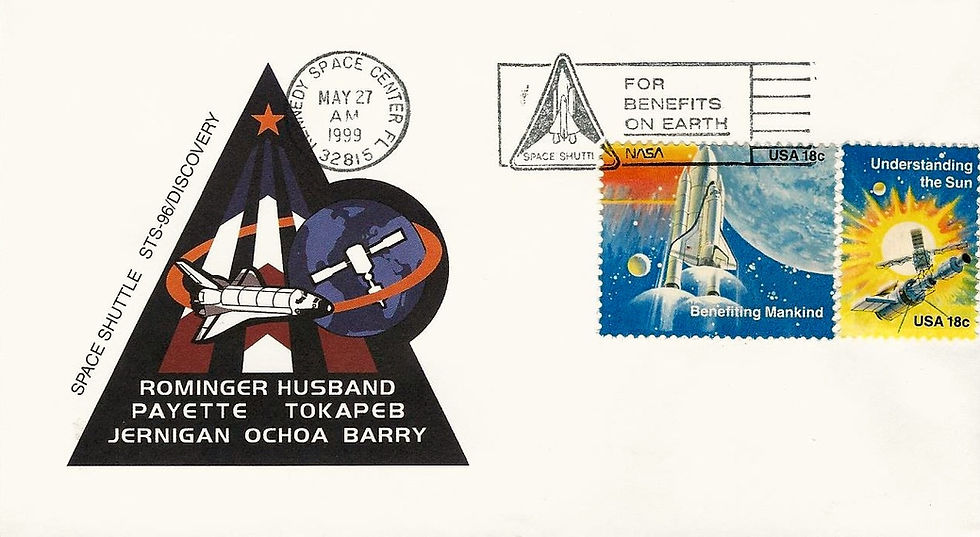
official NASA cover

tracking - launch

tracking

tracking - docking

docking to Unity

docking to Unity

EVA

tracking - undocking

tracking - landing

mission summary

roll out






launch


launch

tracking launch

docking

tracking docking

EVA

return from ISS

tracking undocking

undocking

tracking landing


100th Shuttle flight postmark




official NASA cover

Plazmakristall experiment

ISS 1

mission summary


Rollover

Rollout

official NASA cover



SRB recovery
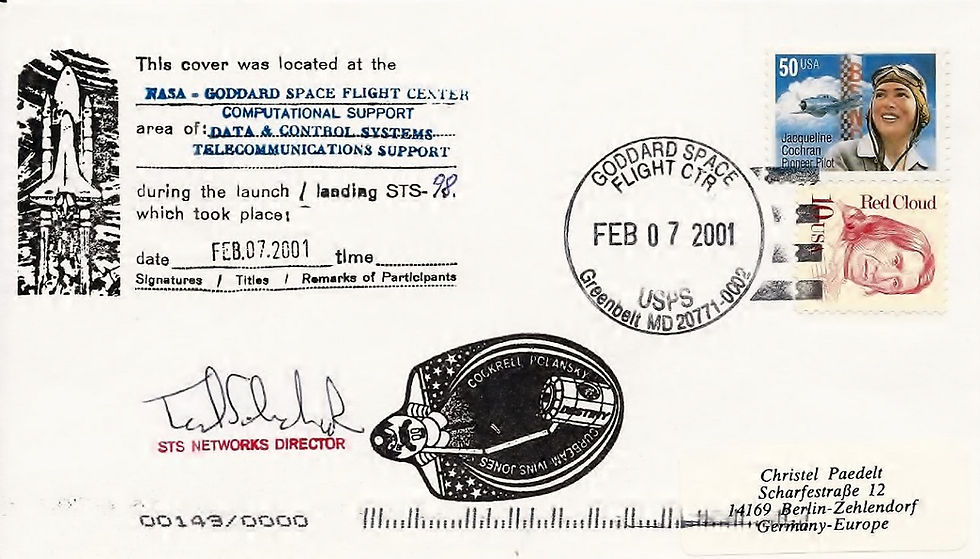
tracking - GFSC

tracking - Korolev

Visiting Expedition - 1

docking - Korolev


GSFC tracking - launch

GSFC tracking - docking

GSFC tracking - EVA I

GSFC tracking - EVA II

GSFC tracking - undocking

GSFC tracking - landing

mission summary

Visiting Expedition - 2

launch

private flown cover

Visiting Expedition - 2

landing

FDOI MPLM postmark


launch

launch - GSFC tracking



landing site - KSC

official NASA cover

tracking launch

tracking docking

tracking EVA

tracking EVA


tracking landing

tracking undocking

mission summary

Visiting Expedition - 3

launch site - KSC

delivered on STS-111

landing site - Edwards AFB

landing site - Edwards AFB

command transfer



docking

EVA-1


EVA-2

EVA-3

undocking

landing site - KSC

undocking


delivered on STS-113


landing site - KSC

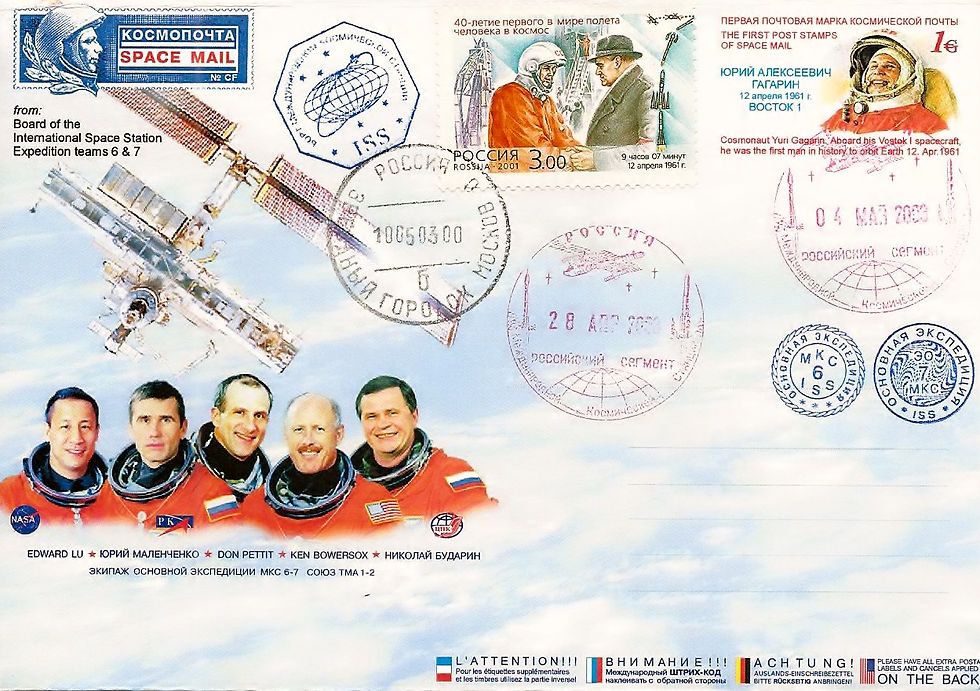
Soyuz TMA-2 arrival Soyuz TMA-1 return

signed by both crews

mission summary





signed by Alexander Kaleri
One of the fancy things about collecting astrophilately is space letters. Basically two types of flown letters can be found – written to the cosmonauts and written by the cosmonauts. I mention only cosmonauts because American space crews do not participate in such kind of collector activities due to NASA policy limiting astronauts to give autographs. This is the reason that some flown covers can be found without astronaut signatures. Back to the letters – they are quite rare and looked by astrophilately collectors but you should be aware of fakes and “flown”-like items. Generally the letters are send to the cosmonauts then taken aboard the Soyuz spaceship to ISS, stamped/signed, sent back to Earth with the returning crew and back to the addressee. The process takes several months in average. Some dealers give the option of getting personal letters for $$$. In terms of the content – if it was not strictly personalized the letters are generally meaningless – sending greetings back and forth…
Here are two examples of letters from the same expedition ISS 5 – Soyuz TMA-1. One was send from Houston to Star City to Sergey Zalyoutin then taken on Soyuz TMA-1 to ISS 5. This letter is addressed to Valery Korzun sending greetings from doctor A. Vasin. It has a very nice batch of onboard cancellations. Such letters have a definite collector orientation and were arranged by the dealers to be commercialized. Another example is a personalized letter written by Sergey Zalyotin in space and sent to Alex Panchenko – space memorabilia collector and dealer. Interesting point in Sergey’s letter that he mentions many collectors’ items he took aboard ISS and will return everything back to Earth as promised. Note much less colorful "space memorabilia" outfit and the half-cut ISS octagon seal - the other part is on the reverse of the cover, to get a 100% bond.
In order to be authenticated the letters bear ISS octagon seal and other stamped postmarks. Besides the relevant postmarks it is good to get such letters via known and trustworthy channels even if it will cost some extra $$$.
The covers used for such letters are general postal covers or some privately designed cachets. As usual they have all available ISS markings and the most important – octagon seal and postmarks with relevant dates. On some occasions official Energia covers are posted but these are more rare cases.









signed by Soyuz TMA-4 and ISS 8 crews

delivered on Soyuz TMA-4

delivered on Soyuz TMA-5













delivered on Soyuz TMA-7

launch

Brazilian serviced cover


landing


After the retirement of the Shuttle, the role of ATV has become crucial for supporting ISS activities which now rely on the essential supplies carried by the European ATV, the Japanese HTV and the old Russian Progress, with its one third of the load capacity of ATV.
Since its first flight, ATV-1 Jules Verne has become a subject for collectors.
The French philatelic Club “La Marianne” (EADS Astrium – France) has issued 4 commemorative covers – offered in a colorful folder printed in a huge number of 1200 pcs that is not common for a specific commemorative set. Other dealers like Michel Vasse (French Guiana based servicer and dealer) and Alexander Lollini produced dedicated covers as well but in much less quantities like 300-400 pcs. Some covers were issued in even smaller numbers.
As a contribution to Space Mail collectors community, ATV-1 delivered to ISS a special protective CTB (Cargo Transfer Bag) containing 1200 covers prepared by the French Club “La Marianne” and 550 cards prepared by the German Club “Erno-Philatelie” (EADS-Astrium, Bremen). 25 covers were marked onboard with the ISS octagonal seal and autographed by the Russian Cosmonauts Sergey Volkov and Oleg Kononenko. All the items were stored in the Leonardo MPLM (Multipurpose Logistic Module) and returned to Earth on November 30, 2008, on board the Space Shuttle Endeavour STS-126 mission which landed at Edwards Air Force Base in California. The CTB, as a non-priority cargo, was recovered from Leonardo on February 4, 2009 and the covers were postmarked at the KSC Post Office.



Hoyerswerda, Germany in mid 2004 ATV-1 entered testing in ESTEC

Jan 2008 - special postmark

Jan 2008 - special postmark

ATV leaving the Estec Test Centre

Launch of ATV from Kourou

tracking by the CELM, cancelled at Biscarrosse, France

docking to ISS postmarked at the Control Centre of Toulouse, France

special ATV-1 postmark on Lollini postcard with stamped cachet

docking to ISS Lollini postcard

ATV-1 docking - Korolev

69th Fair of the Picardie Region Space - From Jules Verne to Planet Mars
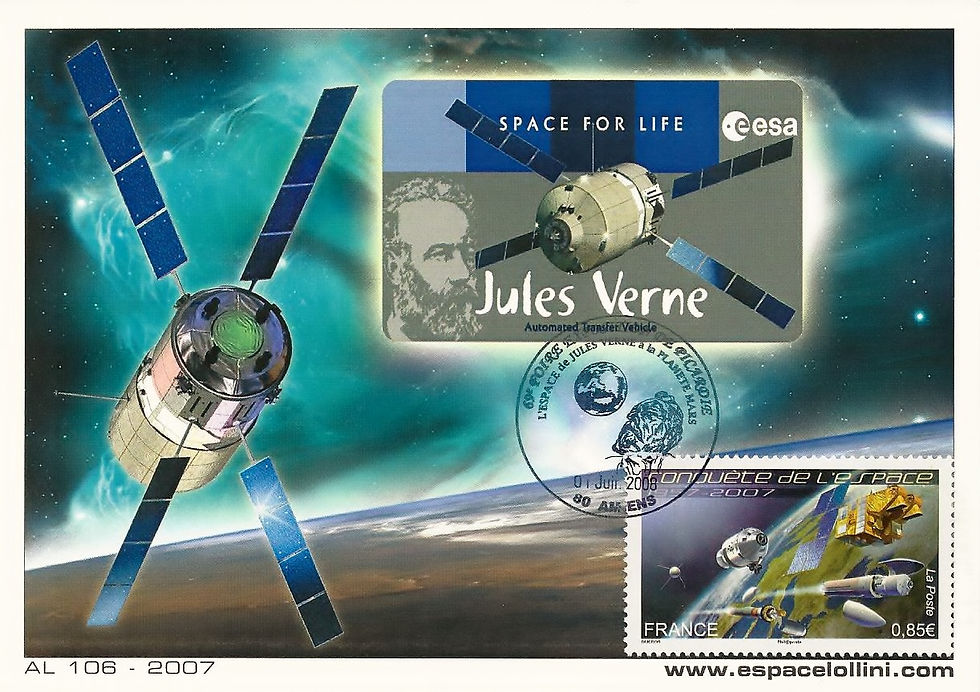
69th Fair of the Picardie Region Space - From Jules Verne to Planet Mars

one of 1200 covers flown to ISS in the ATV-1 CTB and returned to Earth on STS-126

arrival to Kourou Michel Vasse

docking to ISS Michel Vasse

undocking Michel Vasse

deorbiting and reentry Michel Vasse


ISS docking




GSFC tracking

Sergey Chizhov cachet

cover reverse

primary and back-up crews

Sergey Chizhov cachet

postcard format - very uncommon

landing

map of Zhezkazkan landing site


Sergey Chizhov card

1st part

one of the best space cachets!
50th anniversary of Yuri Gagarin flight received a lot of philatelic attention in Russia and was marked by appearance of the first ever onboard ISS special cancellation. Due to the exclusivity of the event many glitches occurred involving the usage of this first postmark. ITC Marka produced the seal and provided it to the Moscow central post office 101000. Director of the office had no idea what to do and how to proceed, so she addressed a group of known philatelists who generally spend a lot of time there. Moscow philatelists prepared covers and cards towards the anniversary and used the postmark to cancel them in March 2011.
There was an agreement not to show the cancelled items before the planed landing of the relevant crew. Unfortunately some “very enthusiastic” comrades cancelled the same cards with Moscow special cancellation on April 12, thus making it obvious the unauthorized ground usage. The next day it was provided to Roscosmos. Roscosmos failed to send it to ISS in time and provided on the closest occasion thus all the onboard cancellations were backdated. On summer 2011 the postmark device was returned to Earth and used to make another batch of “flown” covers, but has been slightly "corrected". The same time a fake “onboard” cancellation was crafted and used along the genuine one.
Moreover, Hermann Sieger’s company ordered 5 covers via Mezhkniga and according to some experts they were “cancelled” on a printer. So there is more mystery than expected.
This is one of the ground covers produced in Kaluga with a fake “onboard” postmark, printed over Gagarin stamp. This is obvious in closer inspection. Nevertheless the cover is signed by Aleksandr Samokutyaev and Andrei Borisenko - Russian crew of Soyuz TMA-21.







1st ISS special postmark


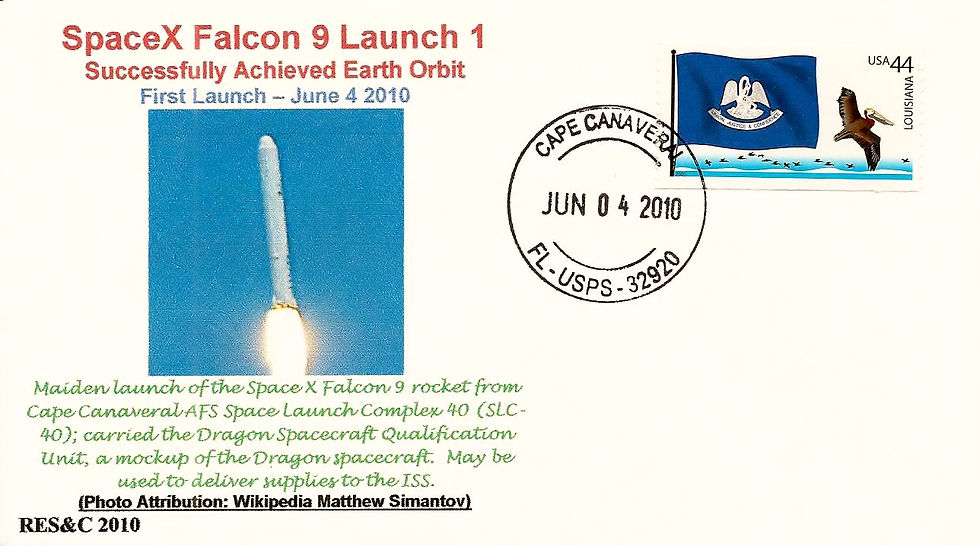
1st launch

1st launch

demo launch


ATV-2 Johannes Kepler launched Feb 16, 2011 was marked by another colorful creation of “La Marianne” club. This time the folder contained 3 covers and totaled only a half of ATV-1 Jules Verne commemoratives – 600 pcs. Two commemorative covers were issued by “La Marianne” to celebrate launch and docking and the third one in the folder was flown in the CTB.
Like ATV-1, ATV-2 also carried to the ISS philatelic items: 600 covers prepared by “La Marianne”, 550 cards prepared by “Erno-Philatelie” and 600 covers prepared by Thales Alenia Space. 153 covers marked with the octagonal ISS onboard stamp and to have them signed by all the Expedition 26-27 crew.
Additional covers were produced including the one issued by “La Marianne” having special ATV-2 cachet and personalized stamp.

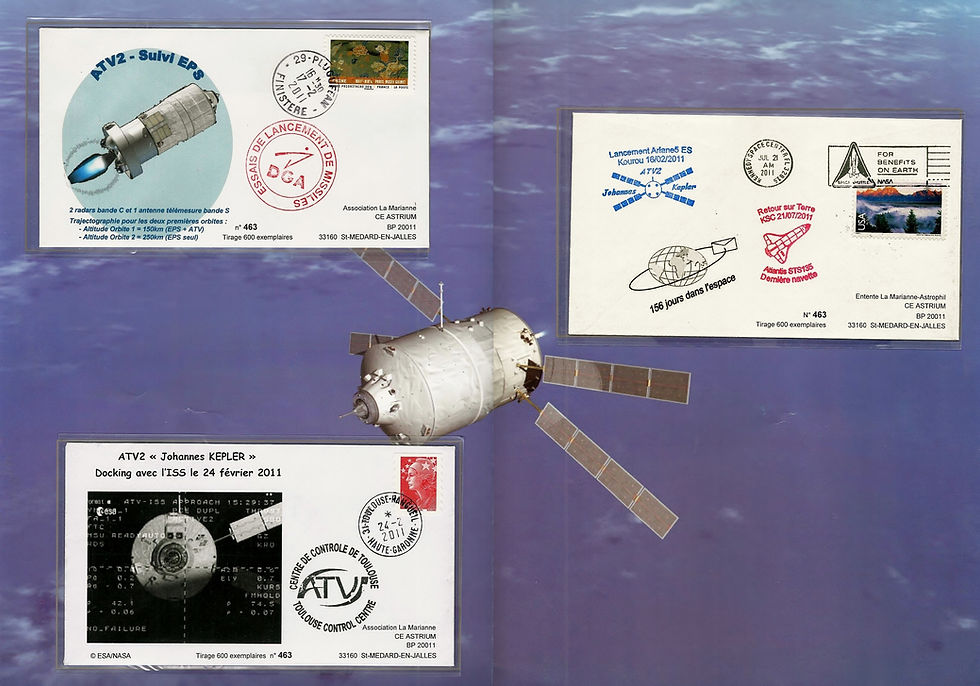




CTB fown cover

Kourou

launch - Korolev

docking - Korolev



2012 showed itself as a year of a cargo ships – never there have been so much activities from different countries – Russia (as usual), Europe (ESA), Japan and now – USA with the first ever private contractor SpaceX Dragon cargo spacecraft. 2012 showed the first successful test flight of SpaceX Dragon C+ ship and the following launch of Dragon CRS -1 mission. Besides mentioned above another notable thing occurred – the ATV-3 Adorado Amaldi flown to ISS covers were taken back by a recoverable capsule of SpaceX Dragon CRS-1 that splashed down in Pacific on Oct 28, 2012. The CTB flown 400 covers of “La Marianne” club were postmarked in Houston on Nov 2, 2012. Another 14 covers were postmarked on ISS and signed by the crew.

launch

tracking launch

tracking by Redu station

docking ISS

docking

docking

docking

SpaceX COTS Demo Flight 2

SpaceX COTS Demo Flight 2

SpaceX COTS Demo Flight 2

SpaceX COTS Demo Flight 2

Korolev

SpaceX COTS Demo Flight 2

undocking ISS

launch

launch

splashdown

CTB flown cover



signed by Soyuz TMA-05 crew



EVA




Jim Roth is the author of the mission 57 Premium Space Covers brand. Hundreds of different issues of Jim's cachet-designed space covers were produced. He would design both sides of a space cover with some of the best colorful and graphically produced artwork creations that I have ever seen. Some of his cachets are numbered to be only 20-30 pieces created. Not very surprisingly the covers look much better in reality than scanned copes. These are one of the best space cachets I have ever seen placing them in a one row with Sergey Chizhov artworks and outstanding Therome cachets. I am proud to have some of Jim’s designs in my collection.




On July 16, 2013 during his second EVA astronaut Luca Parmitano came perilously close to drowning in space after more than a liter of water leaked into his helmet.
Forty-four minutes into the walk, the Italian astronaut noticed the back of his head was wet. Ten minutes later he reported the amount of water was increasing. By the time mission control decided to abort the mission 23 minutes later, large droplets of water were starting to cover Parmitano's eyes, nose and ears as he made his way toward the air lock. Somehow 1 1/2 liters of water had made it into his helmet.
This was one of the closest calls to lose an astronaut during spacewalk in NASA history.







Cygnus Mass Simulator


Luca Parmitano 1st EVA

docking with ISS


Orb-D1 demo flight

landing




launch

docking to ISS

undocking

Lollini combo cover

German pictorial cancellation and personalized stamp

signed by ISS 37 and 38 crews


delivery of Olympic torch to ISS

Soyuz TMA-11M

Olympic torch in space

Olympic torch in space

Gordon Fullerton






flown cover

Janice Voss


BaikonurSvyazInform postmark

welcome event in Star City





landing






CRS-6 cover used


landing

A letter written by Gennady Padalka while commanding ISS Expedition 44. The letter was dedicated to the 40th anniversary of Apollo-Soyuz flight and Gennady record of highest cumulative number of days in space. After being in space and getting all relevant postmarks the letter was posted from Star City to USA. Unfortunately several drops of rain damaged the cover giving it a “harsh serviced” look.



Interesting point regarding ISS "visitor" Aidyn Aimbetov who came aboard Soyuz TMA-18M, besides being the first KazCosmos cosmonaut he was the fourth choice for the "tourist" chair. The primary tourist was planned to be British singer Sara Brightman but she withdrew from training, her backup — Japanese businessman Satoshi Takamatsu was not ready by the launch, then came Russian businessman Filaret Galchev but he dropped as well due to lack of time for training. Finally the spot was taken by KazCosmos.
One cover shows the original emblem of Soyuz TMA-18M with Sarah Brightman name but only two signatures – Volkov and Morgensen. I will try to get Sarah’s to complete the story.







welcome event in Star City






failure

failure

failure

launch

welcome event in Star City

878 days in space


undocking - Sep 11, 2015
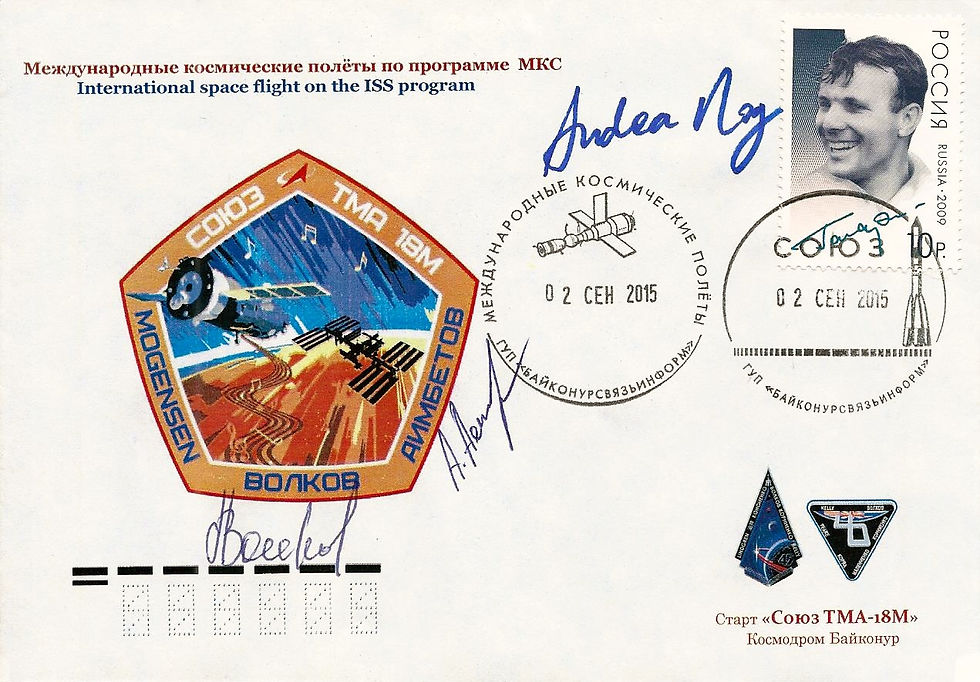
launch

original crew - Sarah Brightman

landing

welcome event in Star City




welcome event in Star City

Deke Slayton II
Special cover commemorating Scott Kelly and Mikhail Kornienko 1 year long stay in space through the ISS 43, 44, 45 and 46 expeditions. The cover signed by all crew members:
Scott Kelly (ISS 43/44/45/46)
Mikhail Kornienko (ISS 43/44/45/46)
Anton Shkarpelov (ISS 43)
Terry Virts (ISS 43)
Samantha Cristoforetti (ISS 43)
Gennady Padalka (ISS 43/44)
Oleg Kononenko (ISS 44/45)
Kimiya Yui (ISS 44/45)
Kjell Lindgren (ISS 44/45)
Sergey Volkov (ISS 45/46)
Yuri Malenchenko (ISS 46)
Tim Peake (ISS 46)
Timothy Kopra (ISS 46),
Aidyn Aimbetov (Soyuz TMA-18M)


BaikonurSvyazInfrom

Huntspex special postmark

VIEWS OF OUR PLANETS






Energia flown cover

welcome event in Star City

welcome event in Star City

S.S. Rick Husband

S.S. Rick Husband






launch

launch


ISS postmarks on reverse

Energia flown cover




welcome event in Star City

welcome event in Star City

launch



launch